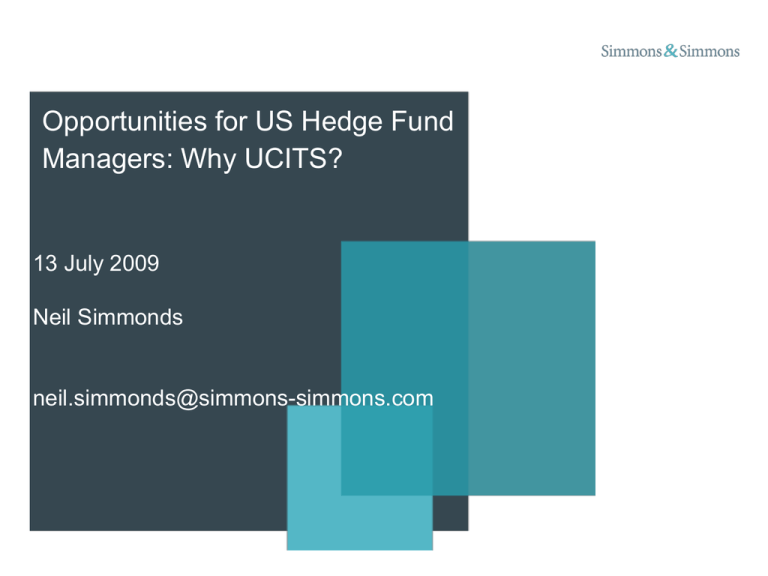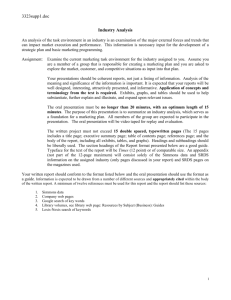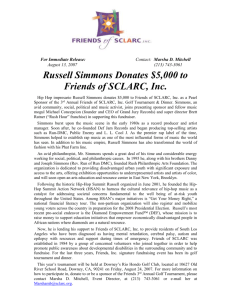US Hedge Fund Managers UCITS
advertisement

Opportunities for US Hedge Fund Managers: Why UCITS? 13 July 2009 Neil Simmonds neil.simmonds@simmons-simmons.com Opportunities for US Hedge Fund Managers Why UCITS? Strategies that can work in UCITS The Basics Setting up a UCITS: Some Key Points Derivatives and Prime Brokerage Looking Ahead…. UCITS IV Q&A © Simmons & Simmons 2008 2 / Doc ID: L_LIVE_EMEA1:6494253v1 Opportunities for US Hedge Fund Managers: Why UCITS? Because: …. the level of regulation affecting HF managers is increasing anyway …. the AIFM Directive will mean you will (probably) need to rethink the domicile of your funds for the European market or at least restructure them …. your strategy (probably) can be adapted to fit within its constraints …. the UCITS passport allows you to access new markets …. UCITS allows you to diversify your product offering/your business …. institutional investors are demanding it and can allocate easier to UCITS …. (It’s not actually very difficult!) © Simmons & Simmons 2008 3 / Doc ID: L_LIVE_EMEA1:6494253v1 The Basics (1) – What is it? UCITS Directive (1985/611/EEC) + UCITS III amendments UCITS II never happened = package of measures no agreement reached mid 90s UCITS III – Management directive and Product directive Eligible Assets Directive (2007/16/EC) in force 23 July 2008 UCITS IV – Re-Cast Directive due to be in force by July 2011 Passport to sell to retail investors throughout EEA A more regulated product for institutional investors in liquid strategies © Simmons & Simmons 2008 4 / Doc ID: L_LIVE_EMEA1:6494253v1 Strategies that can work in UCITS Any liquid strategy: – long/short equity – market neutral – absolute return equities or bonds – global macro (sovereign debt, currency, fixed income, futures) – event driven – merger arbitrage – convertible bond arbitrage – managed futures/CTA (but note commodities exposure) – emerging market debt and equity – structured products – fund of funds © Simmons & Simmons 2008 5 / Doc ID: L_LIVE_EMEA1:6494253v1 The Basics (2) – What can you do? Eligible Assets: – Transferable securities (listed stocks and bonds so not private equity) – Derivatives (exchange traded or OTC) – Money market instruments (MMI) – Deposits – Collective investment schemes (CIS) – Not Commodities/Property/Private equity/Hedge funds 10% “Trash” (can include some hedge funds) Indices and structured notes © Simmons & Simmons 2008 6 / Doc ID: L_LIVE_EMEA1:6494253v1 Indices Derivatives must not be used to circumvent the Directive Underlying must be eligible assets or: interest rates, FX rates, currencies and financial indices Acceptable underlying excludes: - commodities, hedge funds/private equity funds, property But – Derivatives linked to indices are eligible if… Criteria for financial indices are satisfied i.e.: – Sufficiently diversified – Represents an adequate benchmark – Published in an appropriate manner © Simmons & Simmons 2008 7 / Doc ID: L_LIVE_EMEA1:6494253v1 Structured notes Qualify as transferable securities if: – meet TS criteria even if: – backed by/linked to performance of ineligible assets – therefore exposure to commodities and other alternative asset classes? Embedded derivative component – look through applies No embedded derivative component – no look through applies Delta 1 exposure not treated as embedding a derivative (Lux/Ireland) © Simmons & Simmons 2008 8 / Doc ID: L_LIVE_EMEA1:6494253v1 The Basics (3) Spread Requirements: – No more than 20% in another single CIS (max 30% non-UCITS) – No more than 20% deposits with single credit institution (1) – 5/10/40 Rule for securities/MMI of single issuer (2) – No more than 20% securities/MMI of single group – Max OTC counterparty exposure 5% (10% for banks) (3) – No more than 20% in combination of (1), (2) and (3) – GAPS limited <35% single issuer/>35% max 30% single issue and at least 6 issues Concentration Rules: – No significant influence (20% + voting shares) – No more than 10% of the non-voting shares/debt securities/MMIs of issuer – No more than 25% of the units of a CIS Borrowing – only 10% and for “temporary purposes” © Simmons & Simmons 2008 9 / Doc ID: L_LIVE_EMEA1:6494253v1 Setting up a UCITS: Some Key Points Domicile (not Cayman but where?) Umbrella or stand alone? More regulation / Real Regulation Approval Processes (Promoter/Fund) Risk Management Process (RMP) More frequent liquidity Position of Prime Brokers quite different Gates but no side pockets Short positions must be synthetic and obligations covered by cash/other liquid assets © Simmons & Simmons 2008 10 / Doc ID: L_LIVE_EMEA1:6494253v1 UCITS and Derivatives Investment purposes and/or hedging Underlying - Eligible assets PLUS indices, FX rates, interest rates, currencies Global exposure related to derivatives not to exceed NAV i.e. Leverage permitted but only > 100% + 10% borrowing But VaR may be used for “sophisticated UCITS” to achieve greater leverage Counterparty exposure (5%/10%) – net exposure less collateral received – exchange-traded derivatives deemed free of counterparty risk © Simmons & Simmons 2008 11 / Doc ID: L_LIVE_EMEA1:6494253v1 PB or not PB – UCITS and Prime Brokerage Custody Extension of Credit – 10% Borrowing Limit Stocklending and Repos Provision of Margin – Permitted in respect of derivatives, stocklending and forwards – OTC derivatives exposure limits Granting of security Rehypothecation – in respect of margin only Leverage limits © Simmons & Simmons 2008 12 / Doc ID: L_LIVE_EMEA1:6494253v1 UCITS IV – Where are we in the process? January 13, 2009 – European Parliament approved the text of the UCITS IV Directive Council adopted in June 2009 FSA Consultation likely late 2009 In most respects, Member States required to update their local laws by 1 July 2011 CESR Level 2 Guidance by 30 October 2009 © Simmons & Simmons 2008 13 / Doc ID: L_LIVE_EMEA1:6494253v1 UCITS IV – What’s it trying to address? Objectives – Codify (consolidate) UCITS into one Directive – Tackle bottlenecks to industry efficiency Concerns – Administrative obstacles and delays in “passporting” UCITS – Failure of the simplified prospectus to achieve its objective – Fragmented EU fund industry and the lack of economies of scale – Failed implementation of management company passport – Lack of co-operation among regulators Not trying to extend investment powers beyond UCITS III © Simmons & Simmons 2008 14 / Doc ID: L_LIVE_EMEA1:6494253v1 What does it cover? Simplified notification Key Investor Information Document (KIID) Cross-Border Mergers Master/Feeder Structures Management Company passport © Simmons & Simmons 2008 15 / Doc ID: L_LIVE_EMEA1:6494253v1 Strategies that can work in UCITS Any liquid strategy: – long/short equity – market neutral – absolute return equities or bonds – global macro (sovereign debt, currency, fixed income, futures) – event driven – merger arbitrage – convertible bond arbitrage – managed futures/CTA – emerging market debt and equity – structured products – fund of funds © Simmons & Simmons 2008 16 / Doc ID: L_LIVE_EMEA1:6494253v1 Questions and Answers….. © Simmons & Simmons 2008 17 / Doc ID: L_LIVE_EMEA1:6494253v1



